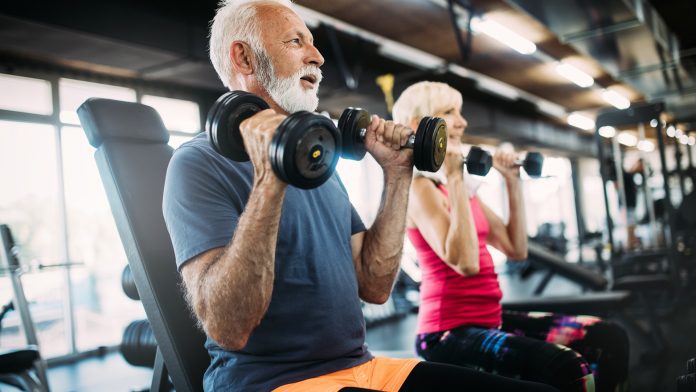
According to new research, regular resistance training can help improve sleep quality in older people, reducing inflammation caused by sarcopenia.
Sarcopenia is the term for the decline of skeletal muscle mass with age. This can lead to a loss of muscle strength which can make everyday activities such as walking and moving objects difficult.
People with sarcopenia may suffer from chronic inflammation, cognitive alterations, heart disease and respiratory disorders. The condition can drastically affect a patient’s quality of life, reduce their independence and increase the risk of injury and death.
Researchers from the Federal University of São Paulo (UNIFESP) and the University of Viçosa (UFV) focused their study on the link between sleep disorders and sarcopenia. Around 15% of adults over the age of 60 are affected by sarcopenia, and 46% of people aged over 80. Sleep disorders often accompany sarcopenia and are also associated with increased inflammation.
Their study, titled ‘Resistance Training Improves Sleep and Anti-Inflammatory Parameters in Sarcopenic Older Adults: A Randomized Controlled trial’, has been published in the International Journal of Environmental Research and Public Health.
Exercise can affect biological rhythms
Previous studies by the same researchers identified a correlation between sleep deprivation and sarcopenia in rat models.
“Our studies of animal models showed that sleep debt causes muscle atrophy and impairs muscle restoration, in a process that closely resembles sarcopenia involving type 2, or ‘fast-twitch’, muscle fibres,” said Helton de Sá Souza, first author of the article and a professor at UFV’s Department of Physical Education.
“Our group had also observed poorer sleep in older people with sarcopenia than older people without this diagnosis,” he added.
Next, the researchers wanted to establish whether human results would be similar to those found in rats. They also wanted to analyse the effects of resistance exercise on biological rhythms. The team hypothesised that resistance exercise could lead to extended sleep time, which would reduce sleep fragmentation and help rebuild muscle mass. In turn, this would help protect the immune system and avoid inflammation.
The researchers examined 14 adults with an average age of 75 who had been diagnosed with sarcopenia. The participants performed a resistance exercise training routine three times a week for three months.
The routine consisted of eight exercises which targeted large muscle groups in the upper and lower limbs. The routine began at moderate intensity before rising to 80% of maximum force in the last eight weeks.
Fourteen other volunteers with sarcopenia attended weekly meetings with health professionals to improve their understanding of how lifestyle changes can help combat the disease. All 28 participants were assisted by physical education professionals, physical therapists, nutritionists, and physicians throughout the study.
Participants also took part in a series of tests, including blood tests to assess hormonal, metabolic and inflammatory markers, body composition analysis, physical function assessment and sleep analysis.
Maintaining muscle mass is vital in managing sarcopenia
The researchers found that the most conclusive diagnostic marker of age-related sarcopenia was the loss of skeletal muscle strength and performance associated with the loss of muscle mass.
“Loss of muscle mass is inherent in ageing, but it becomes a problem with reduced function or performance. If one of these parameters can be improved, then we’ll be able to lessen the sarcopenia,” said Souza.
The researchers found that every metric of muscle strength improved in the participants upon completing the resistance training program, including handgrip and leg torque.
“We also observed an improvement in objective and subjective sleep quality with the aid of polysomnography and a reduction in inflammation,” said Vânia D’Almeida, the last author of the article.
“Older people with sarcopenia tend to sleep badly, and the study showed that physical training both attenuated their sarcopenia and improved their sleep. This may be due to an increase in two anti-inflammatory cytokines associated with muscle metabolism efficiency and possibly with sleep quality,” concluded Souza.






















